Fighting back has become a major focus for companies such as athletic shoemaker New Balance, which has a "zero tolerance" policy for fake goods, spending an estimated $2 million each year combating counterfeiters.
"You'll see them paint on technology instead of actually inserting it, and you'll see other types of copycat methods to make it look like the actual product," said New Balance CEO, Robert DeMartini.
"The consumer gets a substandard product (when a counterfeit New Balance shoe is purchased)," he continued. "Our customer loses some of their proposition because they can't count on us for the business they are expecting us to deliver, and our associates that work hard to make these products high quality—we feel like we are breaking a promise to them as well."
In 2002, New Balance discovered a group in China advertising itself as "American New Barlun (Hong Kong) Limited" conducting business and promoting a relationship with the "American New Balance" company. New Barlun had acquired trademarks similar to those of New Balance and combined them with packaging, advertising, and slogans imitating the brand.
And it went well beyond the making of similar products. New Barlun was selling franchises and opening retail stores throughout China. New Balance took immediate action, working with China's Administration for Industry and Commerce with limited success.


